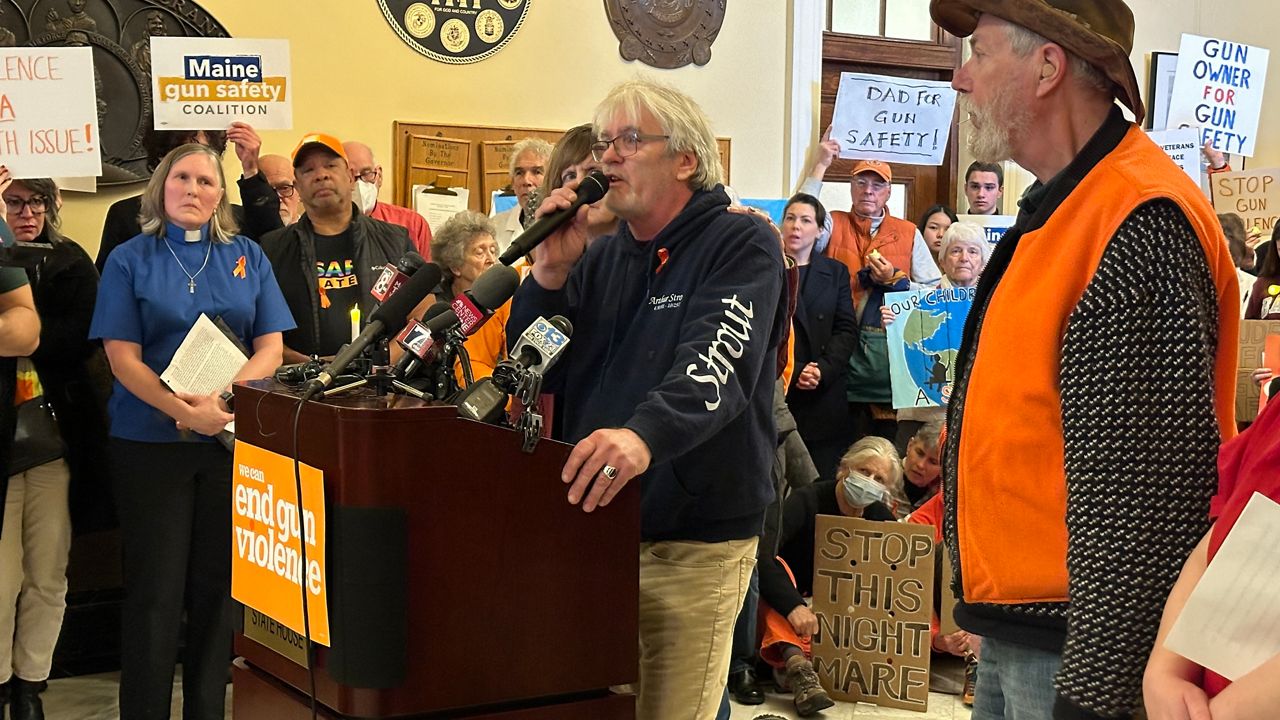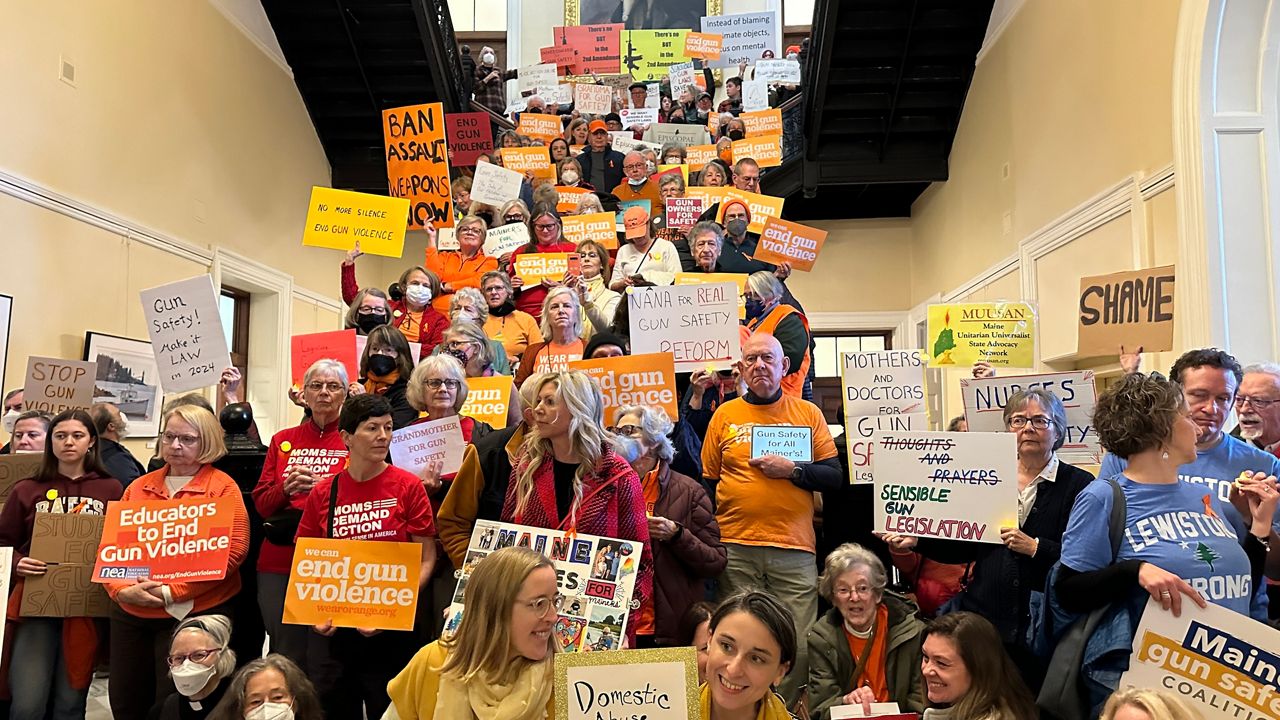The father of one of the 18 people killed in Lewiston in October said Wednesday that efforts to strengthen Maine’s gun laws are not about taking guns away, but “doing the right thing.”
Arthur Barnard said he was at Schemengees Bar and Grille with his son Arthur Strout, 42, on the night of the killings. Barnard had just left the bar when he got a phone call.
“They didn’t have a chance,” he said. “We have to stop being careless as a nation. Not a Democratic thing. Not a Republican thing. Common sense for all of us.”
Barnard spoke in the State House Hall of Flags in front of hundreds on the Maine Gun Safety Coalition’s Day of Action. Even as hundreds more waited in line outside to get through security, Barnard and others called on legislators to pass new laws on the first day of the new legislative session.

(Arthur Barnard, whose son Arthur Strout was one of the 18 killed in the Lewiston mass shootings, calls for lawmakers to work together to end gun violence during a rally at the State House on Wednesday. (Spectrum News/Susan Cover)
As the Senate began deliberations, they passed a resolution honoring the victims of the shootings and had the Lewiston High School Chamber Singers perform the National Anthem.
The debate over whether Maine should change its gun laws in the wake of the deadliest mass shooting in state history is likely to be a dominant theme of the short legislative session.
Yet at this point, there’s no clear consensus on what that will look like or when concrete proposals will come forward. The session is scheduled to end in mid-April.
Ten days after the Oct. 25 Lewiston shootings, the coalition stood outside the State House with four demands — an assault weapons ban, a red flag law, a 72-hour waiting period to buy a gun and background checks on all gun sales.
Earlier this year, lawmakers rejected some of those measures — including the 72-hour waiting period and the expansion of background checks to cover private sales.
On Wednesday, Janel Crowley of the Maine State Nurses Association said 40,167 people in the U.S. died of gun violence in 2023.
“Nurses know moral outrage is not enough,” she said. “Thoughts and prayers do nothing and cannot protect anyone from a bullet.”
Crowley shared a personal story as well, saying that her father, who suffered from mental illness, took his own life with a gun.
“The lack of background checks and red flag laws placed a gun in my father’s hand,” she said. “It left my mother without the love of her life, my brother and I without our dad, my two children with very few memories of their grandpa and my niece and nephew never even had the opportunity to meet their grandfather.”
Following the Lewiston shootings, Gov. Janet Mills vowed to take action, but offered no specifics, saying she wanted to convene a group of stakeholders to find the best path forward.
In a statement Thursday, Mills’ spokesman Ben Goodman said the governor continues to meet with stakeholders and “believes action is needed.”
Goodman also indicated that Mills is “not taking any option off the table.”
In addition to potential law changes, an independent commission is investigating the circumstances surrounding the shootings at a Lewiston bowling alley and a bar to find out why no one was able to stop Robert Card, 40, of Bowdoin, who had been treated for mental illness just months before the killings.
There’s action at the federal level too, with the Army Inspector General agreeing to the Maine Congressional delegation’s request for an investigation into Card’s history with the military and any actions it could have taken.
David Trahan, executive director of the Sportsman’s Alliance of Maine, said last week that his group will put forward options, including some tweaks to the state’s “yellow flag” law, additional guidance to law enforcement on how best to use it and more information about failures that preceded the shootings.
And the National Rifle Association, a prominent presence at the State House, did not respond to multiple requests for comment from Spectrum News on potential gun legislation.
Maine recently received a D- grade for its gun laws from the Giffords Law Center, a slightly better score than last year’s failing grade. The state ticked up a notch because Maine lawmakers passed an anti-gun trafficking law last year, according to the Giffords’ website.
Only 22 states earned a C- or better, according to the group, with Maine among the 28 states getting a D or lower.
Before the rally, state Rep. Austin Theriault (R-Fort Kent), who is running for the Republican nomination in the 2nd Congressional District, put out a statement opposing the “anti-gun rally.”
He criticized the coalition, saying that it gets funding from former New York Mayor Michael Bloomberg.
“Life up here is hard enough,” the statement said. “We don’t need our politicians teaming up with out-of-state billionaires to work against us too. I support the 2nd Amendment because we need to be able to defend our families.”
His statement ended with a call to invest and reform “our mental health system.”
Barnard said many of his friends are NRA members and he thinks many of them would support some changes that might help save lives.
He’s ready to speak to those on both sides of the issue to try to make a difference.
“I know I will probably spend the rest of my life trying to find the right people who are going to do the right thing,” Barnard said. “I want to talk to both sides.”



